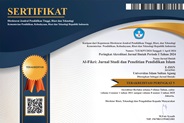Nilai-Nilai Keislaman pada Pendidikan Ketarunaan (Studi terhadap SMK Pelayaran Buana Bahari Cirebon)
Abstract
Keywords
Full Text:
PDFReferences
Aziz, M. A. (2014). ilmu Dakwah. Jakarta: Kencana.
Basri, M. (2021). Sejarah Peradaban Islam. Meda: UIN Sumatra Utara.
Creswell, J. W. (2013). Research Design. Yogyakarta: Pustaka Pelajar.
Gunawan, H. (2014). Pendidikan Karakter: Konsep dan Implementasinya. Bandung: Penerbit Alfabeta.
Hasan, I. (2012). Metodologi dan Aplikasinya. Bogor: Galia Indonesia.
Khurniawan, A. W. (2019). Pendidikan KEtarunaan SMK: Solusi Alternatif Pembentukan Karakter Siswa Berbasis Khasanah Nusantara. White Paper: Vocational Educational Policy, 5.
Mukhlisin. (2019). Pendidikan Karakter IKHLAS. Cirebon: Eduvision.
Nazir, M. (2011). Metode Penelitian. Bogor: Penerbit Ghalia Indonesia.
Purbaya, A. A. (2022, Januari Rabu). Siswa SMK di Semarang di Keroyok. DetikNews.
Ramayulis. (2013). Ilmu Pendidikan Islam. Jakarta: Kalam Mulia.
Sahid. (2016). Legalisasi Hukum Islam di Indonesia. Surabaya: Pustaka Idea.
Sugiono. (2012). Metode Penelitian Pendidikan: Pendekatan Kuantitatif, Kualitatif, dan R&D. Bandung: Penerbit Alfabeta.
Thoyyar, H. (2007). Metodologi Penelitian. Ciamis: IAID Fakultas Tarbiyah.
Undang Undang Sisdiknas. (n.d.).
Warsiyah. (2018). Pembentuk Religiusitas Remaja Muslim (Tinjauan Deskriptif Analitis). Cendekia: Jurnal Kependidikan dan Kemasyarakatan, 16(1), 19-40.
DOI: https://dx.doi.org/10.30659/jspi.6.1.18-41
Refbacks
- There are currently no refbacks.
Al-Fikri is published by the Department of Islamic Religious Education, Faculty of Islamic Studies, Universitas Islam Sultan Agung, Semarang, Indonesia.

This work is licensed under a Creative Commons Attribution 4.0 International License








